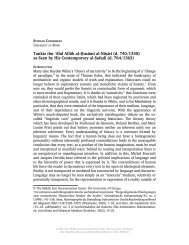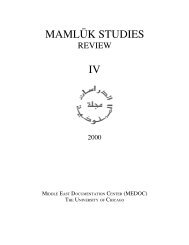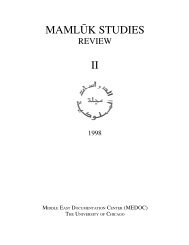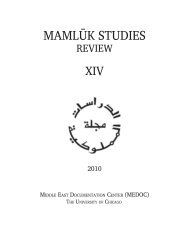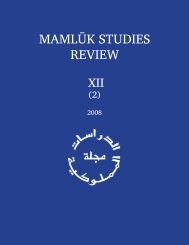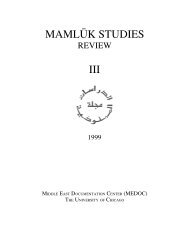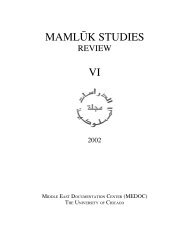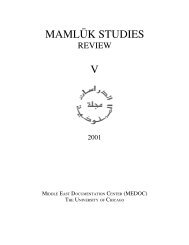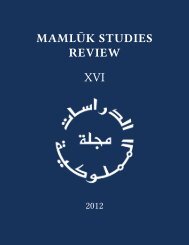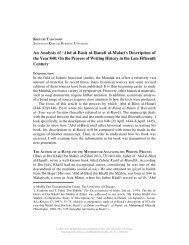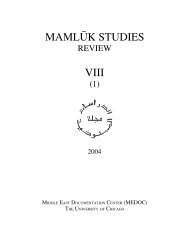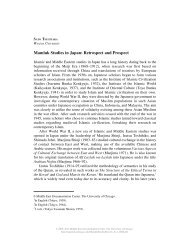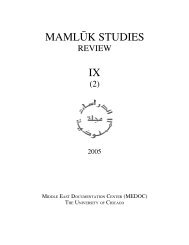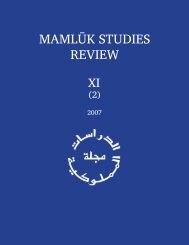Vol. VIII, no. 2 (2004) - Mamluk Studies Review - University of Chicago
Vol. VIII, no. 2 (2004) - Mamluk Studies Review - University of Chicago
Vol. VIII, no. 2 (2004) - Mamluk Studies Review - University of Chicago
You also want an ePaper? Increase the reach of your titles
YUMPU automatically turns print PDFs into web optimized ePapers that Google loves.
MAMLU±K STUDIES REVIEW VOL. 8, NO. 2, <strong>2004</strong> 31<br />
It was with good reason that Venice viewed with concern her prospects for trade<br />
in <strong>Mamluk</strong> lands, because the Brizi-Corner swindle, far from being an isolated<br />
incident, was one <strong>of</strong> many such incidents that had apparently plagued Venetian-<br />
<strong>Mamluk</strong> relations for decades. 22 An addendum to the commission given to Loredan<br />
and Querini suggests that they could strengthen their case before the sultan by<br />
mentioning that "at many times many bancherii 23 had run <strong>of</strong>f from that region, and<br />
never had any sort <strong>of</strong> in<strong>no</strong>vation or molestation been practiced on that account<br />
against merchants or commerce." 24 Venetian traders, it would seem, as a matter <strong>of</strong><br />
course had in their possession goods obtained from Muslim merchants for which<br />
they had <strong>no</strong>t yet fully paid, goods that had been taken either on credit or on<br />
consignment. There is evidence as well that some <strong>of</strong> these goods were carried<br />
<strong>of</strong>f—we must presume legally—from Muslim ports, with expectation <strong>of</strong> later<br />
compensation. In 1369, a time <strong>of</strong> heightened tension between Venice and Egypt,<br />
Venetian citizens who had in their possession the goods <strong>of</strong> "Saracens <strong>of</strong> Egypt or<br />
Syria, subjects <strong>of</strong> the sultan <strong>of</strong> Babylon" are called upon to report the fact, although<br />
in this case it is just as likely that what Venice was planning was a confiscation <strong>of</strong><br />
goods legitimately held in trust, a "freezing <strong>of</strong> Muslim assets," as it were, as<br />
relations with the <strong>Mamluk</strong>s deteriorated completely. 25 A far more clear-cut case is<br />
that <strong>of</strong> one Christ<strong>of</strong>oro Permari<strong>no</strong>, who is reported to have fled Syria with the<br />
belongings and goods <strong>of</strong> Muslim merchants, and whom the Senate orders to be<br />
held, and "dealt with according to what is just." 26<br />
The pr<strong>of</strong>its to be made in the Levantine trade were, obviously, e<strong>no</strong>rmous,<br />
more than compensating for the discomforts and indeed hazards <strong>of</strong> life in so<br />
inhospitable a place. Even without resorting to dishonest means, the person involved<br />
in such trade, especially one <strong>of</strong> such long-term experience as Brizi, could expect<br />
to amass a handsome fortune. And indeed, the Venetians had made honesty<br />
something <strong>of</strong> their stock-in-trade. It was a tremendous advantage to Venetian<br />
traders in the competitive Levantine marketplace to be regarded as always to be<br />
22 We must, <strong>of</strong> course, consider that the charges against the three were manufactured. As <strong>no</strong>ted<br />
above, they had lent money in the past to the sultan and, we may assume, lesser <strong>of</strong>ficials, and it<br />
would <strong>no</strong>t be the first instance where powerful rulers sought to discharge their debts by making<br />
accusations <strong>of</strong> turpitude against their creditors. But the ambassadors and the Senate did find the<br />
evidence compelling and the actions <strong>of</strong> the accused, if <strong>no</strong>t damning, were certainly suspicious.<br />
23 Banchiere generally meant an "international banker," although it could also mean a local banker<br />
or even money changer. See Florence Elder, Glossary <strong>of</strong> Medieval Terms <strong>of</strong> Business, Italian<br />
Series 1200–1600 (Cambridge, Mass., 1934), 39–40.<br />
24 Venice, ASV, Senato Miste, 14 September 1377 (reg. 36, fols. 37r–38v [new numbering 38r–39v]).<br />
We do have to wonder how wise a negotiating ploy it was to bring up such past <strong>of</strong>fenses.<br />
25 Ibid., 31 August 1369 (reg. 33, fol. 30v).<br />
26 Ibid., 20 May 1385.<br />
© <strong>2004</strong>, 2012 Middle East Documentation Center, The <strong>University</strong> <strong>of</strong> <strong>Chicago</strong>.<br />
http://mamluk.uchicago.edu/<strong>Mamluk</strong><strong>Studies</strong><strong>Review</strong>_<strong>VIII</strong>-2_<strong>2004</strong>.pdf



